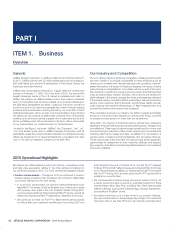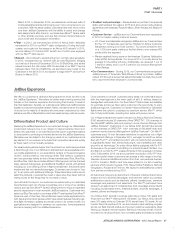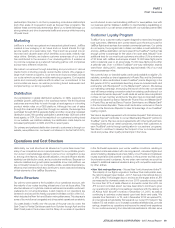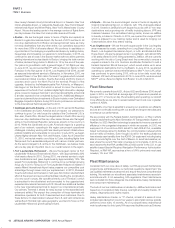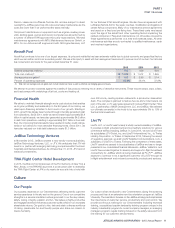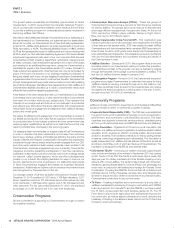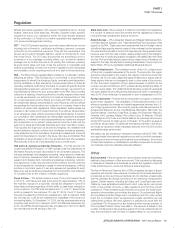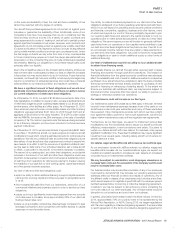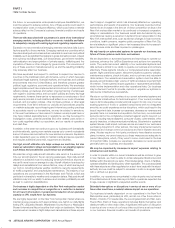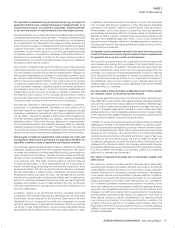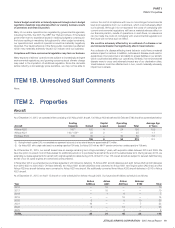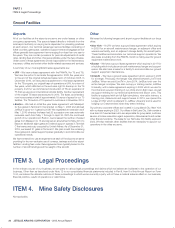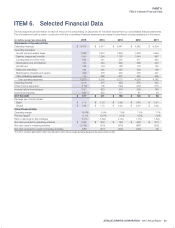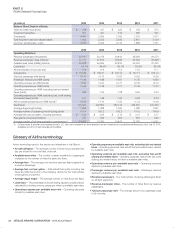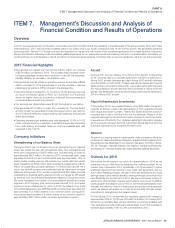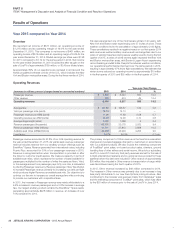JetBlue Airlines 2015 Annual Report Download - page 20
Download and view the complete annual report
Please find page 20 of the 2015 JetBlue Airlines annual report below. You can navigate through the pages in the report by either clicking on the pages listed below, or by using the keyword search tool below to find specific information within the annual report.JETBLUE AIRWAYS CORPORATION-2015Annual Report16
PART I
ITEM1ARisk Factors
the future, or we experience wide-spread employee dissatisfaction, we
could be subject to adverse actions. Any of these events could result in
increased labor costs or reduced efficiency, which could have a material
adverse effect on the Company’s business, financial condition and results
of operations.
There are risks associated with our presence in some of our international
emerging markets, including political or economic instability and failure
to adequately comply with existing legal and regulatory requirements.
Expansion to new international emerging markets may have risks due to
factors specific to those markets. Emerging markets are countries which
have less developed economies and are vulnerable to economic and political
instability, such as significant fluctuations in gross domestic product, interest
and currency exchange rates, civil disturbances, government instability,
nationalization and expropriation of private assets, trafficking and the
imposition of taxes or other charges by governments. The occurrence of
any of these events in markets served by us and the resulting instability
may adversely affect our business.
We have expanded and expect to continue to expand our service to
countries in the Caribbean and Latin America, some of which have less
developed legal systems, financial markets, and business and political
environments than the United States, and therefore present greater
political, legal, regulatory, economic and operational risks. We emphasize
legal compliance and have implemented and continue to implement and
refresh policies, procedures and certain ongoing training of employees
with regard to business ethics, anti-corruption policies and many key legal
requirements; however, there can be no assurance our employees or third
party service providers in such locations will adhere to our code of business
conduct, anti-corruption policies, other Company policies, or other legal
requirements. If we fail to enforce our policies and procedures properly
or maintain adequate record-keeping and internal accounting practices
to accurately record our transactions, we may be subject to sanctions.
In the event we believe or have reason to believe our employees have or
may have violated applicable laws or regulations, we may be subject to
investigation costs, potential penalties and other related costs which in
turn could negatively affect our reputation, and our results of operations
and cash flow.
In addition, to the extent we continue to grow our business both domestically
and internationally, opening new markets requires us to commit a substantial
amount of resources even before the new services commence. Expansion
is also dependent upon our ability to maintain a safe and secure operation
and requires additional personnel, equipment and facilities.
Our high aircraft utilization rate helps us keep our costs low, but also
makes us vulnerable to delays and cancellations in our operating regions;
such delays and cancellations could reduce our profitability.
We maintain a high daily aircraft utilization rate which is the amount of
time our aircraft spend in the air carrying passengers. High daily aircraft
utilization is achieved in part by reducing turnaround times at airports so
we can fly more hours on average in a day. Aircraft utilization is reduced by
delays and cancellations from various factors, many of which are beyond
our control, including adverse weather conditions, security requirements,
air traffic congestion and unscheduled maintenance. The majority of our
operations are concentrated in the Northeast and Florida, which are
particularly vulnerable to weather and congestion delays. Reduced aircraft
utilization may limit our ability to achieve and maintain profitability as well
as lead to customer dissatisfaction.
Our business is highly dependent on the New York metropolitan market
and increases in competition or congestion or a reduction in demand
for air travel in this market, or governmental reduction of our operating
capacity at JFK, would harm our business.
We are highly dependent on the New York metropolitan market where we
maintain a large presence with approximately one-half of our daily flights
having JFK, LaGuardia, Newark, Westchester County Airport or Newburgh’s
Stewart International Airport as either their origin or destination. We have
experienced an increase in flight delays and cancellations at these airports
due to airport congestion which has adversely affected our operating
performance and results of operations. Our business could be further
harmed by an increase in the amount of direct competition we face in the
New York metropolitan market or by continued or increased congestion,
delays or cancellations. Our business would also be harmed by any
circumstances causing a reduction in demand for air transportation in the
New York metropolitan area, such as adverse changes in local economic
conditions, health concerns, negative public perception of New York City,
terrorist attacks or significant price or tax increases linked to increases in
airport access costs and fees imposed on passengers.
We rely heavily on automated systems to operate our business; any
failure of these systems could harm our business.
We are dependent on automated systems and technology to operate our
business, enhance the JetBlue Experience and achieve low operating
costs. The performance and reliability of our automated systems and
data centers is critical to our ability to operate our business and compete
effectively. These systems include our computerized airline reservation
system, flight operations system, telecommunications systems, website,
maintenance systems, check-in kiosks, and our primary and redundant
data centers. Our website and reservation system must be able to
securely accommodate a high volume of traffic and deliver important flight
information. These systems require upgrades or replacement periodically,
which involve implementation and other operational risks. Our business
may be harmed if we fail to operate, replace or upgrade our systems or
data center infrastructure successfully.
We rely on our third party providers of our current automated systems and
data center infrastructure for technical support. If our current providers
were to fail to adequately provide technical support for any one of our key
existing systems or if new or updated components were not integrated
smoothly, we could experience service disruptions, which could result in the
loss of important data, increase our expenses, decrease our revenues and
generally harm our business and reputation. Furthermore, our automated
systems cannot be completely protected against events beyond our
control, including natural disasters, computer viruses, cyber-attacks, other
security breaches, or telecommunications failures. Substantial or sustained
system failures could impact customer service and result in our customers
purchasing tickets from other airlines. We have implemented security
measures and change control procedures and have disaster recovery
plans. We also require our third party providers to have disaster recovery
plans; however, we cannot assure you these measures are adequate to
prevent disruptions, which, if they were to occur, could result in the loss
of important data, increase our expenses, decrease our revenues and
generally harm our business and reputation.
We may be impacted by increases in airport expenses relating to
infrastructure and facilities.
In order to operate within our current markets as well as continue to grow
in new markets, we must be able to obtain adequate infrastructure and
facilities within the airports we serve. This includes gates, check-in facilities,
operations facilities and landing slots, where applicable. The costs associated
with these airports are often negotiated on a short-term basis with the airport
authority and we could be subject to increases in costs on a regular basis
with or without our approval.
In addition, our operations concentrated in older airports may be harmed
if the infrastructure at those older airports fails to operate as expected due
to age, overuse or significant unexpected weather events.
Extended interruptions or disruptions in service at one or more of our
focus cities could have a material adverse impact on our operations.
Our business is heavily dependent on our operations in the New York
Metropolitan area, particularly at JFK, and at our other focus cities in
Boston, Orlando, Fort Lauderdale, the Los Angeles basin and San Juan,
Puerto Rico. Each of these operations includes flights that gather and
distribute traffic to other major cities. A significant interruption or disruption
in service at one or more of our focus cities could have a serious impact
on our business, financial condition and results of operations.


